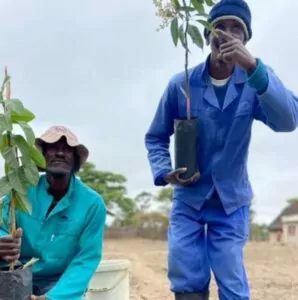 In all our climate projects, we engage and empower local communities. Our latest project, the Imire Climate Wise Reforestation Project is a prime example of this. Engaging local communities in environmental projects is of utmost importance for several reasons:
In all our climate projects, we engage and empower local communities. Our latest project, the Imire Climate Wise Reforestation Project is a prime example of this. Engaging local communities in environmental projects is of utmost importance for several reasons:
Local Knowledge and Expertise: Local communities possess valuable knowledge about the environment, including its ecosystems, resources, and challenges. Engaging them in environmental projects allows you to tap into this knowledge and expertise. They can provide insights into local environmental issues, traditional practices, and sustainable solutions that may not be readily apparent to outsiders.
Sense of Ownership and Empowerment: Involving local communities in environmental projects fosters a sense of ownership and empowerment. When people feel connected to and responsible for their local environment, they are more likely to actively participate in conservation efforts and adopt sustainable practices. Engaging them creates a sense of pride and enables them to become stewards of their own natural resources.
Local Relevance and Contextualization: Every community has unique environmental challenges and priorities. By engaging local communities, you can tailor your environmental projects to their specific needs and concerns. This ensures that the initiatives are relevant and address the issues that directly affect their lives. Taking local context into account increases the chances of project success and sustainability.
 Collaboration and Partnerships: Engaging local communities allows for collaboration and partnerships with various stakeholders, including residents, local businesses, schools, and community organizations. By working together, you can pool resources, share expertise, and leverage collective efforts. Collaborative projects have a higher chance of success and can create a lasting impact.
Collaboration and Partnerships: Engaging local communities allows for collaboration and partnerships with various stakeholders, including residents, local businesses, schools, and community organizations. By working together, you can pool resources, share expertise, and leverage collective efforts. Collaborative projects have a higher chance of success and can create a lasting impact.
Education and Awareness: Environmental projects provide opportunities for education and raising awareness among local communities. By involving them, you can disseminate information about the importance of environmental conservation, sustainable practices, and the impacts of human activities on the ecosystem. This education can lead to behavioral changes, such as adopting eco-friendly habits and promoting sustainable development within the community.
Social and Economic Benefits: Environmental projects that engage local communities can generate social and economic benefits. For example, they can create employment opportunities, support local businesses, and improve livelihoods. By involving community members in project planning and implementation, you can ensure that the benefits are distributed equitably, fostering social cohesion and economic resilience.
Long-term Sustainability: Engaging local communities in environmental projects promotes long-term sustainability. When people are actively involved in decision-making processes and the implementation of initiatives, they are more likely to continue supporting and maintaining those efforts even after external organizations or funding have moved on. Their continued involvement ensures the longevity and effectiveness of the projects.
Overall, engaging local communities in environmental projects recognizes the importance of their perspectives, fosters collaboration, and empowers individuals to take action in their own communities. By working together, we can achieve more impactful and sustainable environmental outcomes.






